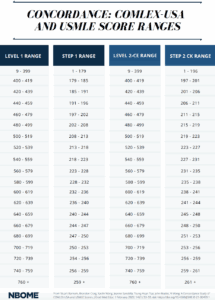COMLEX Level 1 and Level 2-CE Score Percentiles

51491 Views
Are you a D.O. student who is preparing for the COMLEX Level 1 or Level 2-CE exams and is curious about the scoring system and score percentiles? Perhaps you have already taken these exams and are curious about what your 3-digit score means for you. In this blog post, we will help you understand your score and hopefully provide you with some insight as you plan for your residency application.

What are the COMLEX Level 1 and Level 2-CE exams?
The Comprehensive Osteopathic Medical Licensing Examination (COMLEX) of the USA is a three-part series taken by D.O. students all over the country, with passing scores on the Level 1 and Level 2-CE exams (first 2 exams) as a requirement to graduate from their osteopathic medical schools. Like the USMLE Step 1 and Step 2 that allopathic medical students take, these exams assess medical knowledge and clinical skills while also testing osteopathic medical knowledge. The current minimum passing score for both the COMLEX Level 1 and Level 2-CE exams is 400.
How to Convert Your 3-Digit Score Report to a COMLEX Percentile Score
Test takers are given a 3-digit score report, which can be converted to a percentile score using the National Board of Osteopathic Medical Examiners’s (NBOME) Percentile Score Conversion Tool. The percentile score reflects an applicant’s relative performance to others within the specific testing cycle. Below is a chart reflecting the COMLEX Level 2-CE 3-digit score to percentile score conversion for the June 2024-May 2025 testing cohort.
| COMLEX Level 2-CE 3-Digit Score to Percentile Score Conversion (June 2024-May 2025 Cohort) | |
|
3 Digit Score |
Percentile Score |
|
800 |
99 |
|
750 |
99 |
|
700 |
96 |
|
650 |
90 |
| 600 |
79 |
| 550 |
62 |
|
500 |
42 |
| 450 |
22 |
|
400 |
9 |
Score Percentiles for COMLEX Level 1
Following NBME’s change of the USMLE Step 1 to a Pass/Fail system, the NBOME has also announced their transition from a 3-digit score to “Pass/Fail” starting May 10, 2022. While you will receive a comprehensive breakdown of your strengths and weaknesses based on the COMLEX Level 1 Blueprint, residency program directors can only see either “Pass” or “Fail” on your ERAS transcript.
Fill out the form below to receive your free COMLEX Level 1 10-Week Study Planner via email!
A passing score of 400 is approximately equivalent to the 8th percentile, meaning that you must achieve a score that is better than the lowest 8% of all test takers. However, there is no definite way of telling what percentage of questions you need to answer correctly on this 352-question exam to pass.
The pass rate for the 2021-2022 cohort is 92.2% for first-time test takers (n=8089) and 75.8% for repeat test takers (n=681), with a total pass rate of 89.8%. Given this recent change to the scoring format, it will be interesting to see whether the pass rate changes in the upcoming years. With Step 1 being pass/fail, it is possible that more D.O. students will choose not to take Step 1, focusing more on preparing for the COMLEX Level 1 exam.
Understanding Your Percentile Grade for COMLEX Level 1
Based on the data that NRMP released on the 2024 residency match, US D.O. seniors who matched their preferred specialty had a mean COMLEX Level 2 score of 543.9 (SD = 85.6), well above the 2024 minimum passing score of 400. Depending on what specialty you are considering, this is a good score to aim for. For more competitive specialties (e.g. Dermatology, Diagnostic Radiology, Interventional Radiology, Neurological surgery, Orthopaedic surgery, Otolaryngology, Plastic surgery, Thoracic surgery, Vascular surgery), higher scores may be needed.
| COMLEX Level 2-CE Test Scores of Matched and Unmatched D.O. Applicants for the 2024 Residency Match | ||
| Preferred Specialty (# matched applicants) | Average COMLEX Level 2-CE Score
MATCHED |
Average COMLEX Level 2-CE Score
UNMATCHED |
| Anesthesiology (n=307) | 606 | 532 |
| Child Neurology (n=24) | 535 | 486 |
| Dermatology (n=40) | 612 | 556 |
| Diagnostic Radiology (n=148) | 612 | 521 |
| Emergency Medicine (n=981) | 538 | 483 |
| Family Medicine (n=1,316) | 507 | 481 |
| General Surgery (n=258) | 588 | 527 |
| Internal Medicine (n=1,638) | 542 | 448 |
| Internal Medicine/Pediatrics (n=29) | 545 | 513 |
| Interventional Radiology (n=16) | 592 | 556 |
| Neurological Surgery (n=3) | 686 | 529 |
| Neurology (n=166) | 551 | 505 |
| Obstetrics and Gynecology (n=290) | 576 | 510 |
| Orthopaedic Surgery (n=117) | 623 | 567 |
| Otolaryngology (n=26) | 581 | 544 |
| Pathology (n=86) | 547 | 506 |
| Pediatrics (n=570) | 534 | 444 |
| Physical Medicine and Rehabilitation (n=194) | 547 | 490 |
| Psychiatry (n=487) | 525 | 467 |
| Vascular Surgery (n=8) | 623 | 405 |
Although there is added complexity when it comes to fully understanding how residency programs interpret the COMLEX Level 1 scores, we believe that there is generally a positive correlation between performance on the COMLEX Level 1 exam and the USMLE Step 1 exam. It is important to consider that correctly answering the osteopathic-related questions on the Level 1 exam may help boost your score. From this perspective, our expert EMP COMLEX tutors may help you take advantage of this by tackling high-yield osteopathic principles.
Score Percentiles for COMLEX Level 2-CE
While the minimum passing score is the same at 400, this score represents the 5th percentile for COMLEX Level 2-CE. For the 2024-2025 testing cycle, the national mean for Level 2-CE was 525.94. NBOME researchers recently (February 2022) published a paper in the Journal of Graduate Medical Education comparing Level 2-CE scores to Step 2 scores. A score between 540-559 on the COMLEX Level 2-CE roughly translates to a score range of 227-231 on the Step 2 CK. Although the data is not representative of all osteopathic medical students, it can be expected that most residency programs will use this information as their conversion guideline.
Fill out the form below to receive your free COMLEX Level 2 4-Week Study Planner via email!
Mirroring the transition to the Pass/Fail system of the Step 1 exam, the changes in score reporting of the COMLEX Level 1 exam inevitably increase the importance of doing well on the Level 2-CE exam. This holds true, especially for those who elect not to take the USMLE Step 2 exam.
NBOME researchers recently published a paper in the Journal of Graduate Medical Education comparing Level 2-CE scores to Step 2 scores. Although the data does not represent all osteopathic medical students, most residency programs are likely to use it as their conversion guideline.
We hope that this blog post was insightful and helpful in interpreting your score on COMLEX Level 1 and Level 2-CE. If you would like more information on which study materials/resources to use, our EMP tutors have written some amazing resource reviews for Level 1 and Level 2-CE! If you need more focused help on improving your COMLEX scores, please contact us to speak to a medical education consultant.
Featured Articles

